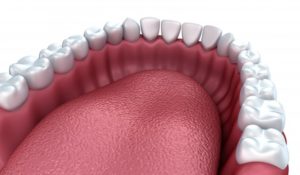 Oftentimes, people seem to forget that the mouth and all its parts can be susceptible to cancer. The lips, tongue, and throat are just a few places cancer can occur. But did you know that salivary gland cancer in Marshall is also a possibility? It might not be the first place you’d think of when considering all the different types of cancer, but it’s just one more reason your dentist strongly encourages you to keep your regularly scheduled appointments. Why? Because he can perform an oral cancer screening. Find out more about salivary gland cancer and why your dentist plays such a pivotal role.
Oftentimes, people seem to forget that the mouth and all its parts can be susceptible to cancer. The lips, tongue, and throat are just a few places cancer can occur. But did you know that salivary gland cancer in Marshall is also a possibility? It might not be the first place you’d think of when considering all the different types of cancer, but it’s just one more reason your dentist strongly encourages you to keep your regularly scheduled appointments. Why? Because he can perform an oral cancer screening. Find out more about salivary gland cancer and why your dentist plays such a pivotal role.
What is Salivary Gland Cancer?
Your salivary glands are what generate the saliva in your mouth. This beneficial fluid helps to wash away bacteria and food particles that can potentially be left behind. This is one reason dentists encourage their patients to stay hydrated to prevent dry mouth. There are two types of salivary glands: major and minor. There are also three types of major salivary glands: parotid, submandibular, and sublingual, in addition to the hundreds of minor glands.
If cancer is present, it begins in one of the salivary glands. Many benign tumors can develop over time, and because they are not cancerous, it will not spread to the other parts of your body. However, you should be aware that there are many different types of salivary gland cancers. The most common types include:
- Mucoepidermoid Carcinoma
- Adenoid Cystic Carcinoma
- Adenocarcinomas
You’ll be happy to know that salivary gland cancer is not common, and according to the American Cancer Society, it makes up less than 1% of cancers in the United States. The average age of those who are diagnosed is 64, and on average, 72% of people with salivary gland cancer are still alive 5 years after being diagnosed.
Why is Early Detection so Important?
Although it’s a rare form of cancer, some doctors and dentists do not recommend testing unless noticeable symptoms appear. Luckily, because of the location of your salivary glands, your dentist in Marshall is trained to look for certain signs that might indicate salivary gland cancer. This type of screening is performed during a routine dental checkup, and you may never even know it’s happening.
Some of the signs and symptoms to look for include:
- A lump or swelling in your mouth
- Pain in your mouth, cheek, jaw, ear or neck
- Trouble opening your mouth
- A difference in size or shape on either side of your face or neck
- A weakness of the muscles on either side of your face
- Difficulty swallowing
What Factors Will Be Considered During Treatment?
Whether salivary gland cancer is found early or not, treatment will begin as soon as possible. While early detection can help with curing cancer, there are still chances cancer can be successfully treated even if not found right away. It’s important to remember that while the primary goal of treatment is to cure the cancer, your team of doctors will also be considering how to preserve the functionality of the nerves, organs, and tissues nearby.
When preparing for treatment, you can expect your doctors to consider:
- The type of salivary gland cancer
- The grade based on how the cancer looks under a microscope and how quickly it will spread and grow (1-3)
- The stage in which the cancer has progressed
- Your overall health
- The chances of a successful cure
- The impact of treatment on your speech, chewing and swallowing abilities
About the Author
Dr. Charlie Parker, DDS, received his undergraduate degree from Baylor University in Waco before completing his DDS degree from the University of Texas Health Science Center in San Antonio. Dr. Parker approaches each patient using integrity and a commitment to provide excellent dental care. This is why he offers oral cancer screenings because early detection is key to successfully treating any type of oral cancer. To find out how we can help you, visit our website or call (903) 935-6351.
 Request A Free Consultation
Request A Free Consultation
